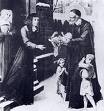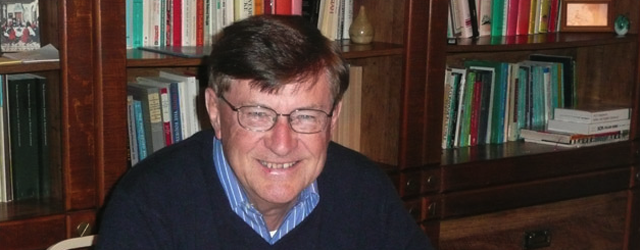Vincent de Paul and Leonard Doohan:
Spiritual Leadership Values and Practices
During the past two decades, the conversation exploring the relationship between spirituality and effective leadership has broadened and deepened. It began in the 1990’s with Peter Senge and others suggesting that leadership is about what Senge calls “personal mastery.” In other words, leadership development is all about self development.
Some researchers see a spiritual dimension to leadership development, in that it involves interior growth toward maturity and integrity as well as increased skills capacity. It requires deep self-reflection and an interior growth aimed at being able to embody in one’s behaviors the positive values to which one is dedicated.
Vincent de Paul’s own personal mastery allowed him to inspire and organize an immense out-pouring of charitable care for people living on the edges of society in 17th-Century France. Statistics bear witness to these works. By one report, nearly ten thousand children were rescued from certain death and hundreds of thousands of poor people were helped through Vincent’s inspiring leadership and the work of his companions.
To come to a better understanding of who Vincent was and the process by which he grew to become the person who accomplished so much on behalf of others, we turn to Leonard Doohan, professor emeritus at Gonzaga University. Doohan is the author of Spiritual Leadership: The Quest for Integrity and Courageous Hope: The Call of Leadership. Here, we will limit our exploration to Doohan’s discussion in Spiritual Leadership of the values which motivate and shape the spiritual leader. We will then look at how these values are evident in the life and teachings of Vincent de Paul.
 Doohan’s Model of Spiritual Leadership
Doohan’s Model of Spiritual Leadership
Leonard Doohan agrees with Senge and says “all leadership development is ultimately self development.” Doohan’s model for spiritual leadership includes 10 core values a spiritual leader lives by in order to balance personal needs with service to others. These 10 core values sustain the spiritual leader over time. Doohan describes each value in the form of a statement that helps clarify how it looks in practice.
The first four core values on Doohan’s list deal with the leader’s vision and sense of mission. He describes them in these words:
– A sense of call and inner integrity
– Nourishing the shared vision and inspiring commitment to it
– Faith in the shared vision
– Relentless pursuit of the common mission
Three other core values deal with the leaders ability to build community and empower others:
– Humility toward one’s own views
– Profound sense of community and human interdependence
– Making a difference in others’ lives
Two values support being pro-active and a risk-taker:
– Challenging others to do their best
– Having courage to say what needs to be said
The final value on Doohan’s list serves to remind the leader of how to stay balanced and keep from being consumed by what happens in regard to developments. It refers to the spiritual discipline of detachment:
– Ability to maintain distance from task and people.
Viewing Vincent as a Spiritual Leader
 Together, Doohan’s 10 Core Values provide a brief framework for viewing the development of a spiritual leader. Next, we will use this framework to briefly consider aspects of Vincent de Paul’s leadership, using comments from his biographers.
Together, Doohan’s 10 Core Values provide a brief framework for viewing the development of a spiritual leader. Next, we will use this framework to briefly consider aspects of Vincent de Paul’s leadership, using comments from his biographers.
1. Vincent: A sense of call and inner integrity
It is clear from his biographers, that Vincent initially entered the priesthood as a path to financial security, and even prosperity for himself and his family. This was not uncommon in the period.
Some years after he had established himself in the priesthood, Vincent was offered a position as spiritual director to a wealthy landowner, Madame de Gondi, and tutor to de Gondi children. He became chaplain to the peasants that lived on the estates and in the villages owned by the family.
Bernard Pujo explains that it was during subsequent years, as Vincent accompanied Madame de Gondi on her charitable visits to the peasants on the estate, that Vincent began to reflect on the deep misery he witnessed among the poor. At the same time, Vincent became aware that the local clergy were inadequately trained in their duties and were unable to effectively respond to peoples’ spiritual needs. Vincent himself began to try to address this lack, by teaching, preaching and hearing confessions.
Pujo calls this a period of “radical transformation” for Vincent:
“He was constantly confronted with misery, both physical and spiritual. This brought him an interior illumination, an understanding that his personal vocation was to place himself at the service of the poor and the sick where they were most abandoned, in the countryside. He was pierced with a conviction that would be the foundation of his future work- that help for the least favored of society should be both material and spiritual. …It is true that he had a long way to go before he could cast off the old man, but now he knew where the road was.” (67)
These experiences led to the “change of heart” which would inspire the extraordinary passion through which Vincent drew others to his cause.
2. Vincent: Faith in a shared vision
Vincent practiced developing a shared vision in part through his constant letter writing. Two examples indicate his steadfast commitment. The first is an excerpt from a letter written to James Pesnell, whom Vincent had placed in charge of one of the houses established by the congregation, offering affirmation and encouragement:
“I was very pleased to see the detailed account of the state of your Community; I thank you very affectionately for it. You have done it so well that I seem to see things exactly as they are. There is reason to hope they may go on better and better under your wise guidance, which seems to be humble, charitable, simple, and judicious. God is always to be found in the practice of these virtues, and especially in the first two, and, in proportion as you try to practice them, do not be afraid, Sir, but that God will work in and through you, and that all will go well.” (Letter to James Pesnelle, superior at Genoa from Paris, July 25th, 1659)
Even in hard economic times, Vincent could be steadfast in the inspiration provided by his vision, as this brief excerpt from a letter to another superior indicates:
“You should not be surprised or frightened at a bad year or at several bad years; God is abundantly rich; up to this you have wanted for nothing; why do you fear for the future?” (Letter to Anthony Durand, Superior At Agde, About May, 1658)
3. Vincent: Nourishing shared vision and inspiring commitment to it
Vincent was aware of the stages of growth of any enterprise, and encouraged that in others, as evidenced by the following advice he offered: “Remember that good establishments are not called into being suddenly, but little by little. All works have their best beginnings and their developments.”
Vincent also encouraged his colleagues to be patient when it came to the unfolding of the vision: “Have patience! The beginnings of important works are always painful.”
4. Vincent: Relentless pursuit of a common mission
Once Vincent became committed to his mission, he seems to have moved forward without hesitation to take whatever action he could to respond to the needs as he became aware of them. Pujo tells us that with Madame de Gondi’s consent, he began to expand his work of offering missions to all the people living on the family’s lands, which numbered some 8,000 people.
Vincent’s plan of action was to preach missions in the parishes, and then in each parish establish an organized charity through which the enlisted women continued to respond to the physical and spiritual needs of the people after he moved on.
5. Vincent: Profound sense of community and interdependence
Vincent’s France was marked by a very strict pyramidal social stratification involving religious, economic and social identifiers and boundaries. The religious clergy, like Vincent, were considered members of the “first estate,” while the nobility occupied a lower tier (the “second estate”). These were all supported by the labor of artisans and farmers (the “third estate), who lived from the land. (Rybolt, 2005).
Vincent’s personal journey led him to eventually turn this societal pyramid upside down, often declaring the poor to be “our lords and masters.” In one of his letters dated April 6, 1643, he wrote “What God asks of us in particular is to have great care to serve the poor, who are our lords. Oh! Yes, they are our masters.”
6. Vincent: Humility toward one’s own views
There are numerous examples within the research on Vincent that indicate his humility. Once, he worked successfully to organize relief efforts for “the large number of beggars loitering in the streets” of a city he visited. Later, Vincent left the city in secret “so as to avoid the honors prepared for him by the aldermen of the city and the acclaim of the populace” (Pujo, 80)
Vincent also was very humble about his own beginnings, and often was heard to remark: “I am the son of a plowman; I have herded swine and cows” (Pujo, 4). He often preached on the need for humility. In one his conferences, he said, “Humility is a virtue so comprehensive, so difficult and so necessary that we can never reflect on it sufficiently.”
7. Vincent: Making a difference in others’ lives
One of the most poignant examples of Vincent’s efforts on behalf of the poor and abandoned is his work as chaplain to the slaves who powered the French galleys. Upon being asked to enter into this role, he found the condition of the slaves to be so wretched, that he immediately set about to improve their situation.
As Pujo writes: “Moved by this experience, [Vincent] decided to speak of the matter to the General of the Galleys, requesting the authorization to try to improve the lot of those whose health was most in danger. These were moved into a rented house near the Church of Saint-Roche, which was transformed into the Saint-Roche prison.” (Pujo,78)
8. Vincent: Having courage to say what needs to be said
Vincent’s dedication to his mission and his obvious capabilities eventually brought him into the service of the queen. One rather humorous story from that period illustrates his forthrightness and his wisdom when it came to human affairs. Here is how Pujo describes the event:
“Vincent’s modest and reserved bearing did not prevent him from asserting his opinions and defending them vigorously; he was perfectly able to oppose a cardinal or some lord in the matter of conferring benefices or nominating bishops. The story goes that a great lady of the court applied to the queen for a bishopric for her son. The queen asked Vincent whether he would approve such a nomination. When he replied that the son in question was not worthy of the position, the queen left him to inform the duchess of her refusal. The duchess showered Vincent with insults and in rage, she threw a footstool at his head and wounded him.Vincent withdrew without a word, bowing respectfully and covering his bleeding face with a handkerchief. The brother who accompanied him was indignant and wanted to intervene somehow, but Vincent calmed him down, saying, ‘Isn’t it admirable to see the extent of a mother’s love for her son!’ ” (Pujo, 161)
9. Vincent: Challenging others to do their best
One of the most often quoted Vincent phrases at DePaul University is his advice that “It is not sufficient to do good, but it must be well done” (Coste, 177). Vincent was in frequent contact with Louise de Marrilac “now encouraging, now gently reprimanding when she gave in to her crises of scrupulosity. Pujo gives us this example of Vincent’s approach to words of encouragement for Louise: ‘I cannot help but tell you that tomorrow I will really reproach you for giving in to these vain and frivolous anxieties. Oh, prepare yourself to be well admonished!’” (Pujo, 101).
10. Vincent: Ability to maintain distance from task and people
It is clear from his writings that Vincent knew himself well, and also knew well the source of inspiration for his mission in the model of Jesus Christ. At the same time, although convinced of his commitment and authority, he did not operate out of ego-attachment to his foundations, as evidenced in this remark in respect to the congregation he founded and its mission:
“If the Community follows my advice, it shall be firmly grounded in the maxim of never seeking an establishment, either directly or indirectly; because if we are good, we shall never lack establishments, and if we are not good, then we already have too many.”
![]() This value, working along with relentless commitment, involves a simultaneous detachment from the mission that allows for inner freedom and renewal.
This value, working along with relentless commitment, involves a simultaneous detachment from the mission that allows for inner freedom and renewal.
These examples from Vincent’s life and teachings invite us to consider ways in which we promote our own inner self development as leaders, assuring that our daily actions always are consistent with our values and beliefs.
Questions for Reflection
How often do you set aside time to reflect on your own core values and how consistently you embody them in your decisions and actions?
As a leader, how do you invite those on your team to consider their personal values in light of organizational values?
In what ways do you nourish commitment to the vision and mission of your organization for yourself and others?
Resources
Doohan, Leonard, Spiritual Leadership: The Quest for Integrity. New York, NY: Paulist. 2007
Pujo, Bernard. Vincent de Paul: The Trailblazer. Notre Dame, IN: University of Notre Dame. 2003
Edited by Patricia M. Bombard, BVM, D.Min., Director, Vincent on Leadership: The Hay Project, DePaul University, Chicago, IL USA



